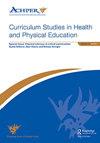The (mis)alignment between young people’s collective physical activity experience and physical education curriculum development in Ireland
IF 2.1
Q2 EDUCATION & EDUCATIONAL RESEARCH
Curriculum Studies in Health and Physical Education
Pub Date : 2020-08-19
DOI:10.1080/25742981.2020.1808493
引用次数: 9
Abstract
ABSTRACT Major curriculum changes have recently occurred in Ireland, including redeveloping the primary curriculum and the enactment of the Junior Cycle Framework (DES, 2015). Positive and negative experiences affect the attitudes which contribute to determining the quality of curricular experiences. Framed in the work of Fullan, M. (1991. The New Meaning of Educational Change. Toronto: Teachers College Press) and Dewey, J. (1997. Experience and Education. New York, NY: Touchstone), this study aims to understand how young people’s experiences of collective physical activity can inform physical education curriculum development and enactment. Focus group interviews were conducted in three primary and three post-primary schools. The young people’s experiences reflected the features of meaningful physical education: fun opportunities, preferably outside; to socially interact with friends; provision of activities that are both competitive and non-competitive; activities focused on team sport and alternative forms of movement such as yoga; differentiated activities and teams and choice, beyond choosing between team sports only. We argue that the young person’s voice has the potential to inform policy and practice, as well as enforce and advocate for policy and practice that positions young people at the centre of the learning experience.爱尔兰年轻人的集体体育活动体验与体育课程开发之间的(错误)一致性
摘要爱尔兰最近发生了重大的课程改革,包括重新制定小学课程和制定初中周期框架(DES,2015)。积极和消极的经历会影响态度,从而决定课程体验的质量。由Fullan,M.(1991年。教育变革的新意义。多伦多:师范学院出版社)和杜威(1997)。经验和教育。纽约:Touchstone),本研究旨在了解年轻人的集体体育活动体验如何为体育课程的制定和实施提供信息。在三所小学和三所小学后学校进行了焦点小组访谈。年轻人的经历反映了有意义的体育教育的特点:有趣的机会,最好是在户外;与朋友进行社交互动;提供竞争性和非竞争性活动;专注于团队运动和瑜伽等其他运动形式的活动;区分活动和团队以及选择,而不仅仅是在团队运动之间进行选择。我们认为,年轻人的声音有可能为政策和实践提供信息,并执行和倡导将年轻人置于学习体验中心的政策和实践。
本文章由计算机程序翻译,如有差异,请以英文原文为准。
求助全文
约1分钟内获得全文
求助全文
来源期刊

Curriculum Studies in Health and Physical Education
Social Sciences-Education
CiteScore
3.00
自引率
10.50%
发文量
33
 求助内容:
求助内容: 应助结果提醒方式:
应助结果提醒方式:


